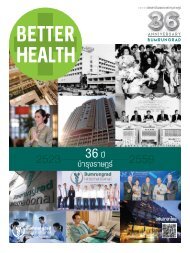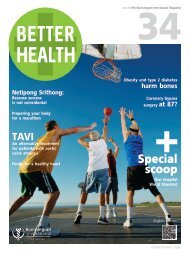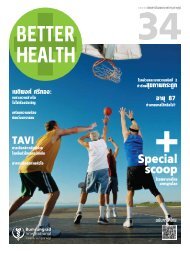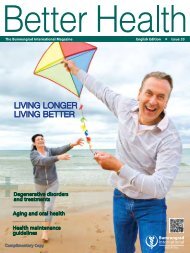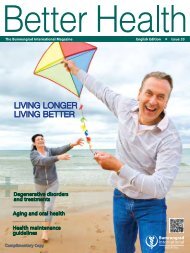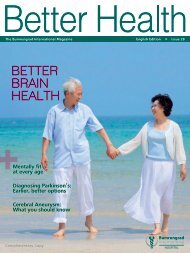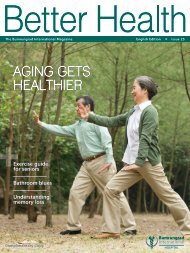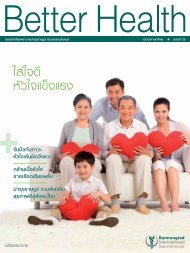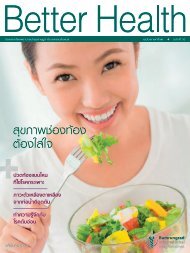All pdf BH Issue 33 Eng
Create successful ePaper yourself
Turn your PDF publications into a flip-book with our unique Google optimized e-Paper software.
GERIATRIC MEDICINE<br />
Living longer, living better<br />
Living a long and happy life<br />
Long life is priceless. You are given the extra time to<br />
experience more that the world has to offer. Seems<br />
true enough, but only if you have one thing – your health.<br />
A long life, but with deteriorating health, leads to<br />
dependence on others – the antithesis of freedom and<br />
enjoyment.<br />
Can older persons expect to have a good quality of life<br />
longer into their later years? The answer awaits you in<br />
this edition of .<br />
Elders as the majority<br />
The proportion of older persons within the population<br />
is increasing rapidly. A 2014 survey by Thailand’s National<br />
Statistical Office found that 14.9 percent of the kingdom’s<br />
population is over 60 years of age, approximately 10 million<br />
people. The Institute of Population<br />
and Social Research, Mahidol<br />
University, predicts that these<br />
senior citizens will continue to<br />
live for an average of 20 years for<br />
men and 23.6 years for women.<br />
Dr. Lily Chaisompong, who<br />
specializes in geriatric medicine,<br />
analyzes this phenomenon.<br />
Thailand is shifting to a predominantly<br />
aging society, in step<br />
with global trends. “Ten years<br />
from now, it will be the first<br />
Dr. Lily Chaisompong<br />
Geriatric physician<br />
time in Thailand’s history that<br />
there will be more people aged<br />
60 years or older than minors,”<br />
Dr. Lily says. “And in about 25 years, there will be about<br />
20 million people over the age of 60, approximately onethird<br />
of Thailand’s population.”<br />
The increase is a result of advances in medical technology,<br />
efficient public health management, and a continually<br />
decreasing birth rate. “People over 80 years old today<br />
average at least four children per household to take care<br />
of them, whereas those just entering old age (60 years old),<br />
now only have two children per household to look after<br />
them.” Dr. Lily notes. “Today, families have fewer children,<br />
but people live for up to 20 to 30 years after retirement.<br />
The question is, how the older person can maintain a good<br />
quality of life, independently, for as long as possible?”<br />
To age well, start planning early<br />
Maintaining health into older age requires long term<br />
planning. “Start planning when you’re between 30 or 40<br />
years old,” Dr. Lily advises. “When you meet older people<br />
in good health, ask them what they did to stay fit. You’ll<br />
see their answers are quite similar: a diet of nutritional<br />
foods, regular exercise, and staying engaged in hobbies<br />
and interests to promote good mental health.”<br />
Dr. Lily makes clear these characteristics derive from<br />
good habits established in early adulthood. “It’s unlikely<br />
that people who start exercising at 60 or 70 will get the<br />
same benefits, or even enjoy them as much, as people who<br />
started much earlier,” she says. “The same goes for hobbies<br />
and activities: for those who put in the effort now to develop<br />
skills and expertise that help ward off depression and<br />
loneliness later in life. Starting late means less time to build<br />
this foundation and reap the benefits.”<br />
But it’s never too late to start! Today’s older persons<br />
must take charge of their health more so than in previous<br />
generations to prepare themselves for longer lives that<br />
they can enjoy.<br />
Geriatric medicine is the answer<br />
Geriatric medicine was developed to help older persons<br />
maintain a good quality of life as they age. With the current<br />
demographic trends mentioned above, this specialization<br />
becomes ever more critical to older persons and their<br />
families.<br />
There are distinct changes in older adults’ bodies that<br />
require care that is different from young and middle aged<br />
adults. “The elderly are not sick adults, but rather, they<br />
4



